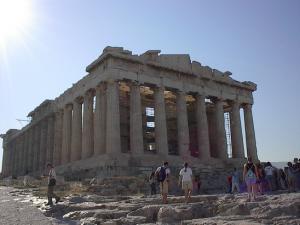When the City is in Trouble
What to do when education has been corrupted and seeks profit over truth? How should a society respond when those who should love wisdom instead love trickery? What if those who should care about divine things instead love personal peace and affluence?
Plato’s dialogue The Sophist is not an easy read, but is necessary when times are bad. Plato was in a society rapidly declining from a Golden Age. Within one generation from his death, city-state Athens would disappear.
If Hellenism is one of the major sources for our global civilization, then Golden Age Athens was a great tributary of Hellenism with a lasting influence far greater than the length of time during which it endured. Every institution of higher eduction around the globe studies the philosophy, theology, art, and literature of that little city. The greater were her achievements, the more tragic her sudden fall.
How can an educator, one labeled “wise,” end up being a grifter? This happens when ideas are no longer challenged and definitions examined.
An Example of How to Go Wrong
Plato wanted nothing to do with dead education. In his dialogues, he forces his characters to examine the ideas of even the great teachers. In The Sophist, we are given two characters named Socrates (old and young) for double the Socratic inquiry into the assumptions of one such school of thought: the Eleatic School of Parmenides.
There is a snare in following a great thinker such as Parmenides. He was groundbreaking and those less creative or wise are tempted to repeat his con especially looking at ideas of being and non-being taken for granted from the time of Parmenides. This philosopher had posed a riddle (roughly “being cannot not be”) that became a truism. The slogan had infected intellectuals and they had not taken the time or made the effort to examine how to escape the trap that implied (amongst other unlikely conclusions) that all motion was impossible! Instead, they composed elaborate puzzles or intellectual traps to slow down the examination of the cosmos.*
Study of the nature of things had reached a dead end. The sophists stopped advancing knowledge, or even living examined lives, to repeating the assumptions of the founder of their schools of thought. One such founder, Parmenides, was a master intellect with a fetching style, but his greatness should have spurred more thought not less, even from those that agreed with him. Over the course of the dialog, Plato’s Socrates presents alternative possibilities or refinements to Parmenides’ ideas.
If the followers of Parmenides tried to bring an end to dialogue by asserting the conclusions of the mastermind, Plato showed the sterility of such certainty. He was brutally effective in showing how mindless repetition of even the most brilliant ideas is corrupting. Since the sophist has nothing “new” to say, he can grift by teaching others to parrot the party line. Others, perhaps wealthier, are able to be mere dilettante: wealthy drifters repeating old ideas to puzzle the people.
Plato’s picture of this degeneration in educators made the term “sophist” an insult! The “sophist” was not the true lover of wisdom (the philosopher), but one who appeared to love wisdom, but loved only his “school of thought” and the conclusions he had inherited.
A City will tolerate the Sophist, but not the Philosopher
Socrates may not have had his own alternative ideas to the Eleatics, but he refused to let philosophy die without wondering. One might have thought that the city would welcome this defense of the continued possibility of studying the cosmos, but one would be wrong. Socrates irritated the city elite enough that they killed him.
Why wasn’t the city equally offended with the strangers wondering into town with neutering doctrines? The sophists did not just survive, they thrived and were hired to teach the elite children.
The reason is simple: the sophists repeated their ideas, taught them, but were content to enjoy the good things of Athens. Socrates taught no idea, but wanted to examine everything, even the city. The sophist, grifter or dilettante, was no threat because the grifter could be bought and the dilettante could not be bothered. Time spent with the sophist would increase the vocabulary, make the youngling sound clever, and even hone his ability to pose intellectual puzzles.
The real lover of wisdom, Socrates, would stop at nothing.
Education may find truths that endure, because true! Right reason can endure any examination. However, this examination must continue at every level of education or wondering decays into sophistry. Intellectual puzzles are fun for a Mediterranean night near a fire with some fresh caught fish and good wine. Don’t I know! However, life changing philosophy, the peering toward the True Light, is dazzling and often painful. Old ideas are refined, if not discarded, and even when the truth eventually endures, it can seem at risk.
This lesson is one the Christian Church, partly the product of Hellenism, always had known.
There is peril in philosophy, but also promise. Until time ends, God’s children seek the divine and God reveals truth to them. The ultimate act of this truth was in Jesus, the Divine Son. Yet even His living truth can become sophistry in us if all we do is repeat the truth and refuse to live the examined life. We can say truths without seeing Truth. The promise of wisdom comes when we are refined, purified, and see more. When sustained, the old truth does not just endure, but leads to questions that expose more truth. Absolute romance toward the Beautiful longs for separation from all but the beloved. This purity finds chastity and all chastity ends in greater love.
The love of wisdom, philosophy, is bountiful, not sterile sophistry.
Some devotional thoughts from The College at the start of a session on The Sophist.
*The terms “physics” and “metaphysics” were not used in our way at the time of Plato, but safe to say that Parmenides and the Eleatics had seemingly ended both.













